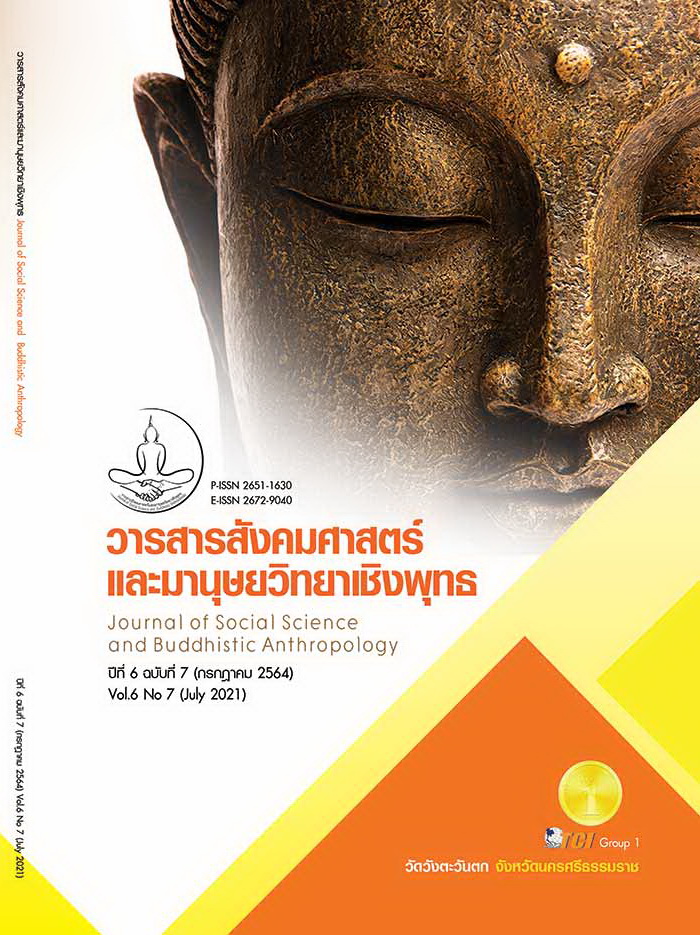CASHLESS SOCIETY FROM CASH - BASED TO CASHLESS ECONOMY IN THAILAND
Keywords:
The Cashless Society, Technology Acceptance, Electronic Payment, Consumer BehaviorAbstract
The objectives of this research article were to study the changes. A cashless society from a cash economy to a cashless society in Thailand. Factors related to the cashless society economy and to study Develop a conceptual framework for a cashless society economy. The sample was the population calculated using Yamane’s calculation. Until obtaining a representative group, 400 illustrations in each region and 400 examples in Bangkok, totaling 2,800 samples, then used stratified random sampling to reach the representative. The research results are that Thailand is likely to develop from a cash economy society. To a cashless economy, This is due to the changing behavior of financial services according to the data of the Bank of Thailand during 2015 - 2019 with a declining trend. The use of electronic payment channels is likely to increase. It shows a cashless society’s economic transition towards a cashless society and related personal factors, including gender and age, occupation, education level, and income correlated with electronic payment behavior. For the regression analysis, the researcher found that 1) factors influencing decision making 2) technology acceptance about Electronic payment behavior By region classification of forecasting equations in raw scores and standardized equations. It can use relevant factors to develop conceptual frameworks, Which have the initial variables including Personal factors, Factors influencing decision making, Adoption, and use of technology. The dependent variables are Electronic payment behavior.
References
อดุลย์ จาตุรงคกุล. (2539). พฤติกรรมผู้บริโภค. กรุงเทพมหานคร: มหาวิทยาลัยธรรมศาสตร์.
Allen, H. (2003). Innovations in retail payments: e-payments:e-payment. Bank of England Quarterly Bulletin, 43(4), 428-438.
Baddeley, M. (2004). Using e-cash in the new economy: An economic analysis of micro-payment systems. Journal of Electronic Commerce Research, 5(4), 239-253.
Bech, M. L. et al. (2018). Payments are a-changin’- but cash still rules. Retrieved March 11 , 2020, from https://www.bis.org/publ/qtrpdf/r_qt1803g.pdf
Chaudhary, T. (2017). The critical analysis of cashless transaction. International Journal of Commerce and Management Research, 3(3), 92-94.
Chen, Y. (2015). Exploring Consumers’ Payment Behaviours atCompleting Micro-Transactions withVending Machines in Sweden. In Disciplinary Domain of Humanities and Social Sciences, Faculty of Social Sciences, Department of Informatics and Media, Human-Computer Interaction. Uppsala university.
Davis, F. D. (1989). Perceived usefulness, perceived ease of use, and user acceptance of information technology. MIS quarterly, 13(3), 319-340.
Economides, N. (2001). The impact of the Internet on financial markets. Journal of Financial Transformation, 1(1), 8-13.
Garcia-Swartz, D. et al. (2007). Further thoughts on the cashless society: A reply to Dr. Shampine. Review of network economics, 6(4),509-524.
Garg, P. & Panchal, M. (2016). Study on Introduction of Cashless Economy in India 2016: Benefits & Challenge’s. Journal of Business and Management, 19(4), 116-120.
Khan, J. & Craig-Lees, M. (2009). Cashless transactions: perceptions of money in mobile payments. International Business & Economics Review, 1(1), 24-30.
Kumari, N. & Khanna, J. (2017). Cashless payment: A behaviourial change to economic growth. Qualitative and Quantitative Research Review, 2(2), 84-90.
Nicko van Someren. (2002). The practical problems of implementing Micromint. In Syverson P. (eds) Financial Cryptography. FC 2001. Lecture Notes in Computer Science. Springer, Berlin, Heidelberg.
Thomas, H. et al. (2013). MasterCard Advisors' Cashless Journey The global journey from cash to cashless. Retrieved March 11 , 2020, from https://newsroom.mastercard.com/wp-content/uploads/2013/09/Cashless-Journey_WhitePaper_FINAL.pdf









